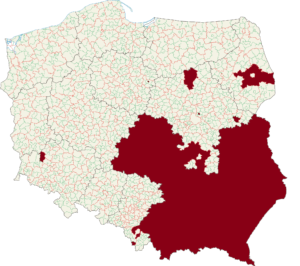Liberals think that facts are persuasion. They are not – says Stanford Professor, Anna Grzymala-Busse
Since the presidential elections in Poland in July, the entire power lies in Law and Justice hands. The campaign against LGBT community is getting tougher. Non governmental organizations are now in the crosshair with a new project announced by United Poland from the ruling coalition. Polish Constitutional Tribunal will examine if the Istanbul convention against domestic violence is in line with the Polish constitution. What country will be Poland in the short and long term perspective?

Stanford University/Andrew Brodhead
The short term that we should be thinking about are the next three years, before the next parliamentary elections. The Polish government, having received a powerful mandate without any possibility of vetoing, will continue with its judicial project, with basically replacing more judges and the judiciary reforms that will put the judiciary under parliamentary oversight. It will speed up with the repolonization and deconcentration of the media as it has been already announced by the Law and Justice (PiS) leaders. And I think it will continue to walk a fine line between the need for EU funding versus the worry about potential sanction from the European Union. The most recent EU budget that got approved sent a very ambiguous signal, because depending on how it’s interpreted, it either basically gives free rein to both Poland and Hungary, imposing a very light and very unlikely conditionality; or it can be used more rigorously, but I doubt that will happen.
Will the Polish government go further in conflict with EU institutions or will it continue playing a similar game as Viktor Orban has been doing for years? So to increase polarization and scepticism in the Polish society around the EU, and taking advantage of the fact that Europe is focused on its own challenges.
The Polish government will not be able to do this in a way that Orban did. The first reason is that Orban’s Fidesz party is very well represented in the majority party in the European Parliament, the European People’s Party. Manfred Weber (a former EPP president), and other leaders, protected Fides all along, so Fidesz could do whatever it wanted to with impunity. PiS does not belong to EPP and it doesn’t have that political backing. Secondly, Orban was very precise in how far he would push the European Union and would do everything with enormous legal preparation. Nothing was passed willy-nilly. All of the things were done legally and constitutionally, after he changed the Constitution.
PiS has been unable to do that. It doesn’t have the discipline and doesn’t have the competence to prepare the ground legally, nearly as well as Orban did. So it’s much more likely to be castigated by the EU, both because it doesn’t have the political backing and because it’s not as sophisticated.
How this situation might affect the Polish society’s attitude towards the EU? Do you think the anti-European sentiment will rise in these next 3 years?
I don’t think that Polexit is a real threat. The vast majority of Poles support EU membership and at rates higher than almost any other EU country. So there’s absolutely no public support for this. Secondly, the enormous financial gains that Poland has obtained by being in the EU mean that it would be suicidal for PiS to try to exit the Union. Billions of euros of subsidies flow into Poland, year in year out, and with that to be cut off, PiS would be left with very little funding to implement its plans. Third of all, everybody recognizes that this is the cheap anti-EU rhetoric that is employed by populists everywhere. No one cares about that within the EU and Polish voters are also very good at distinguishing that rhetoric from actual plans. What raises greater concern in Brussels is the breaking of European Union rules, including going after the judiciary. This kind of criticism should be taken much more seriously as it might mean that rather than Poland exiting the EU, the EU might eventually impose sanctions on Poland.

PMs of Poland and Hungary: Victor Orban and Mateusz Morawiecki | Photo: Kancelaria Premiera (public domain)
With the judiciary, civic society and press freedom continuing to be taken over and limited by the government, how would you call Polish democracy?
Democracy is imperilled. A liberal democracy necessitates both a rule of law and the freedom of speech association and media. So if the press is constrained like this and the judiciary is no longer free, Poland will no longer be a fully liberal democracy. There’s no question about that.
However, I don’t think we are anywhere close to where Hungary is, for the simple reason that there is no constitutional supermajority. Hungary looks the way it does because Fidesz in 2010 gained the two thirds majority that allowed it to rewrite the Constitution. PiS doesn’t have either the numbers or the competence to do this. And so PiS will nibble away at democracy without changing the constitution, the fundamental electoral laws, or the entire system of government. It has been attacking the Ombudsman, it has been attacking all kinds of regulatory institutions, but it cannot remake Poland into an authoritarian regime the way that Fidesz was able to.
You have been examining the role of the Catholic Church in Polish politics for many years. The Church supports the anti-LGBT campaign, the xenophobic language against minorities and PiS pays off. Will this alliance strengthen the radicalization and polarization of the society?
The church has gotten smarter. It’s realized that every single government from 1989 onwards basically gave it what it wanted. The church knows fully well that it can bring down a government if it wants to, even if it can’t elect one. It no longer pursues direct involvement in politics but it has its own issues. The “LGBTQ ideology” and earlier, the wars over gender, are both campaigns to keep people from looking at the church itself: at the pedophilia scandals, the financial malfeasance, the empire of Rydzyk. And here it’s finding a very useful partner with people like president Andrzej Duda, who very happily used the same phrases, even though it met with protest. For the church Duda and PiS are very convenient, but they’re not necessary.
Some observers of the Polish politics tend to think that PiS radicalizes its agenda in fear of the rise of the far-right parties like Konfederacja. At the same time, these movements for the last decade seem to have quite stable support not exceeding 10 percent.
That is right and if you look at the European democracies almost everywhere you have around 10 to 15 percent for the extreme right-wing parties. Whether it’s Konfederacja in Poland, the AfD in Germany, the Association of Slovak Workers and some versions of this. If anything, what’s surprising is how well they’ve done in Western Europe. In Italy The League is in the government, Le Pen came within three points of Macron in the 2017 elections. So the far-right does better in Western Europe than they do in new democracies.

Map of Poland with so-called LGBT ideology-free zones declared (as of end of January 2020) by Fashaj, Wikimedia Commons, CC BY-SA 4.0
Why does this divisive rhetoric and the type of populism represented by PiS maintain so attractive for the majority of voting Poles? Together with Stanford FSI, you have recently published a report on Global Populism and their challenges.
It’s not the majority of Poles and it’s never been the majority of Poles who voted for PiS in parliament, so I would be careful. But yes, they obtain enough support to win the elections. There are two factors. One is that the mainstream political parties in Poland have basically spent themselves. Democratic Left Alliance (SLD) collapsed in 2004 and then Civic Platform (Platforma Obywatelska, a central wing party) offered the so-called “warm water in the faucet” policies. After two elections, they were offering nothing new and they just assumed that voters would vote for them again. That lack of responsiveness and accountability by the Civic Platform part and of the other parties certainly played a role.
The second point: what PiS did was to very precisely target itself to rural Poland, to people who are in the lower middle class. Their runaway success of the 500+ program bought its support among voters who otherwise wouldn’t support the party. And it was brilliantly done. It didn’t destroy the budget and it means the difference for some families between being able to afford clothing and not. For other families that they suddenly can get violin lessons or an extra trip. That brings a sort of dignity to everyday life that I think a lot of Poles felt they didn’t get from the previous governments. It cannot be underestimated.
The better condition of the families’ budgets was seriously challenged by the pandemic and rapid growth of prices caused by inflation. Kaczynski didn’t want to postpone presidential elections as for the first time, there was a chance he might have lost it.
PiS again showed how incompetent it is. The whole episode around the elections with the last minute Gowin and Kaczynski agreement, then the postal office running the elections, was just a grand show of incompetence. It was just yet another example that revealed that no matter how committed PiS might be to its authoritarian policies, it is amateurish. It cannot even falsify an election properly. That’s one of the things that covid pandemic revealed and this is actually heartening. My standard line has always been that Fidesz and PiS have the exact same commitments, but PiS has half the competence that Fidesz does.
At the same time, Poland has actually handled the first months of the pandemic pretty well: the instant imposition of the quarantine, the encouragement to wear masks, the fact that Poland took shut its borders relatively quickly. Other countries were doing worse.
How should the opposition in Poland use these next three years?
There are two things that the opposition ought to do. First, not to fight among themselves.The critical thing to do is to offer an alternative to voters. The more the opposition will criticize each other, the less credible that alternative would be. Second, they should demonstrate the consequences of government actions for citizens. It’s not enough to just criticize the government for being anti-democratic and assuming this matters to the family that’s weighing the child subsidy against voting for the opposition. Most voters care about how their own lives change. That kind of accountability and responsiveness has been missing in Polish politics for a long time.
The ruling coalition is not a monolith, and the politicians like the ministry of justice Zbigniew Ziobro will try to get as much power as possible. Are those internal battles a real threat for PiS?
So far PiS has managed keeping its fractions and coalition members together. It is also not clear to me who the replacement for Kaczynski would be. I don’t see a split within PiS anytime soon, also because they know that their only future politically is to stick with power.
One of the most effective tools of maintaining the power are propaganda media. Populist politicians, not only in Poland, became immune to any scandals revealed by independent journalists. By using organized disinformation campaigns and propaganda, politicians effectively discourage the audience from demanding the truth.
I think one lesson can be drawn from the pandemic in the United States and what’s been happening to Donald Trump. Trump has always been spreading lies, disinformation, and propaganda. But when the real crisis hit, that strategy proved incredibly shortsighted because no one believed him. Even Republicans don’t trust him with a proper pandemic response. They all trust Dr. Anthony Fauci, CDC Director, not Trump.
For the opposition, this may sound terribly quixotic, but there is something to be said about simply sticking to the truth and trying to persuade people rather than slinging mud.
At the same time, many people in the US followed Trump, who didn’t want to wear a mask for months and denied the seriousness of the pandemic.
The propaganda works because it often contains a kernel of truth and it plays on people’s emotions. But if you tell people they shouldn’t wear a mask because it’s an affront to their liberty and their masculinity, that’s very different from asking someone to wear a mask because that way you can be the protector of your family. The facts and the truth have to be there, but there has to be an attempt to persuade and touch people’s emotions. Liberals are very bad at it. They think that facts are persuasion. They are not.
Professor Anna Grzymala-Busse: Michelle and Kevin Douglas Professor of International Studies, Senior Fellow at Freeman Spogli Institute for International Studies at Stanford University. Her research focuses on populisms, political parties, state development and transformation, religion and politics, and post-communist politics. She is an author of the books: Redeeming the Communist Past, Rebuilding Leviathan, Nations Under God.
Anna Gielewska: John S.Knight Fellow 20 at Stanford University, political and investigative journalist, focused on countering disinformation and propaganda. A board vice-chairman of Reporters Foundation (Poland).
Anna Gielewska is co-founder and editor-in-chief of VSquare and co-founder of Polish investigative outlet FRONTSTORY.PL. She is also vice-chairwoman of Fundacja Reporterów (Reporters Foundation). A journalist specializing in investigating organized disinformation and propaganda, Gielewska was the John S. Knight Fellow at Stanford University (2019/20) and has been shortlisted for the Grand Press Award (2015, 2021, 2022) and the Daphne Caruana Galizia Award (2021, 2023). She was the recipient of the Novinarska Cena in 2022.







